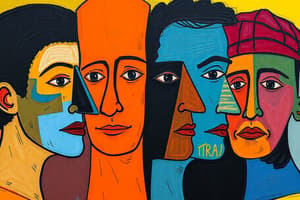Podcast
Questions and Answers
How do high status groups perceive the status differential that favors them?
How do high status groups perceive the status differential that favors them?
- As non-existent
- As equally significant as members of lower status groups
- As less significant than members of lower status groups (correct)
- As more significant than members of lower status groups
According to national surveys, how do white respondents perceive progress toward equality?
According to national surveys, how do white respondents perceive progress toward equality?
- No progress at all
- Some progress
- A lot of progress (correct)
- Not much progress
What is the 'racial divide' in the United States referred to in the text?
What is the 'racial divide' in the United States referred to in the text?
- A divide based on income level
- A divide based on geographical location
- A divide based on political preferences
- A divide based on perceptions of progress toward equality (correct)
According to Kahneman and Tversky's prospect theory, how do people generally respond to changes framed as potential losses?
According to Kahneman and Tversky's prospect theory, how do people generally respond to changes framed as potential losses?
What does it mean to be 'risk averse' according to Kahneman and Tversky's prospect theory?
What does it mean to be 'risk averse' according to Kahneman and Tversky's prospect theory?
What is the definition of prejudice?
What is the definition of prejudice?
What does discrimination refer to?
What does discrimination refer to?
What are some of the group memberships that prejudice can be based on?
What are some of the group memberships that prejudice can be based on?
What does stereotyping refer to?
What does stereotyping refer to?
How does our group membership affect perceptions of social events?
How does our group membership affect perceptions of social events?
What is the affective component of attitudes toward a social group?
What is the affective component of attitudes toward a social group?
What does discrimination concern according to the text?
What does discrimination concern according to the text?
What are cognitive frameworks that influence the processing of social information?
What are cognitive frameworks that influence the processing of social information?
What are beliefs about social groups in terms of the traits or characteristics that they are believed to share?
What are beliefs about social groups in terms of the traits or characteristics that they are believed to share?
What distinguishes gender stereotypes according to the text?
What distinguishes gender stereotypes according to the text?
What is the 'women are wonderful' effect as described in the text?
What is the 'women are wonderful' effect as described in the text?
What does the Glass Ceiling refer to in the context of the text?
What does the Glass Ceiling refer to in the context of the text?
What is the glass cliff effect as described in the text?
What is the glass cliff effect as described in the text?
What is the main problem faced by women as mentioned in the text?
What is the main problem faced by women as mentioned in the text?
What does tokenism refer to based on the text?
What does tokenism refer to based on the text?
Flashcards are hidden until you start studying
Study Notes
Social Perception and Prejudice
- High-status groups tend to perceive a smaller status differential that favors them, downplaying the extent of their advantage.
- According to national surveys, most white respondents perceive progress toward racial equality, but this perception varies widely depending on the respondent's race.
Prospect Theory and Risk Aversion
- Prospect theory (Kahneman and Tversky) suggests that people generally respond more strongly to potential losses than potential gains, leading to risk aversion.
- Risk aversion refers to the tendency to prefer avoiding losses over acquiring gains.
Prejudice and Discrimination
- Prejudice is defined as a negative attitude or emotion toward a group or its members.
- Discrimination refers to the unfair or unjust treatment of different groups or individuals.
- Prejudice can be based on various group memberships, including race, ethnicity, religion, gender, and more.
Social Perception and Cognition
- Stereotyping refers to the process of assigning oversimplified or inaccurate characteristics to a group or its members.
- Our group membership influences our perceptions of social events, often leading to biased or distorted views.
- The affective component of attitudes toward a social group refers to the emotional response or feeling associated with the group.
Cognitive Frameworks and Social Information
- Cognitive frameworks, such as schemas and stereotypes, influence the processing of social information and can lead to biased perceptions.
- Beliefs about social groups, including their traits or characteristics, can perpetuate stereotypes and prejudice.
Gender Stereotypes and Discrimination
- Gender stereotypes are distinguished by their rigidity and resistance to change.
- The "women are wonderful" effect refers to the phenomenon where people perceive women as more wonderful and virtuous than men.
- The Glass Ceiling refers to the invisible barriers that prevent women from advancing to higher-level positions.
- The Glass Cliff effect refers to the phenomenon where women are more likely to be appointed to leadership positions during times of crisis or high risk.
Tokenism and Women's Challenges
- Tokenism refers to the practice of including a small number of individuals from underrepresented groups to give the appearance of diversity and inclusion.
- The main problem faced by women, according to the text, is the challenges they face in achieving leadership positions and overcoming gender stereotypes.
Studying That Suits You
Use AI to generate personalized quizzes and flashcards to suit your learning preferences.




